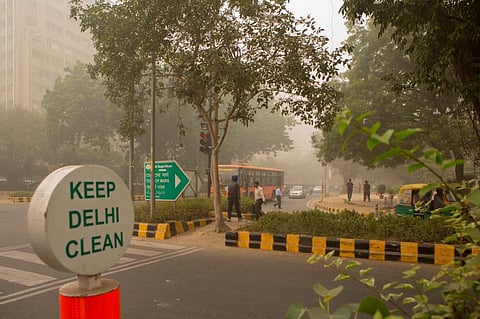Reading into new air policy for Delhi-NCR: Focus on prevention, timely intervention
The Commission for Air Quality Management (CAQM) in the Delhi-National Capital Region (NCR) as well as adjoining areas recently updated the policy to curb air pollution in the region.
The interventions in the new policy focus on:
- Thermal power plants
- Construction and development (C&D) waste
- Municipal solid waste
- Clean fuels and electric mobility
- Public transportation
- Road traffic management
- Diesel generators
- Regulating firecracker burning during the winter months when the region’s air quality level worsens
Time-frames have been set for implementing the various measures, as well as according to regions and sub-regions.
The policy suggested segmented interventional approach and timelines for the following sub-regions:
- The National Capital Territory of Delhi
- The NCR districts near Delhi — Gurugram, Faridabad, Sonipat, Jhajjar, Rohtak (Haryana), Ghaziabad, Gautam Buddh Nagar and Baghpat (Uttar Pradesh)
- Other NCR districts
- The entire state of Punjab and the non-NCR districts of Haryana, primarily for addressing episodic events of stubble burning
The important features for transformation in this policy include:
- Widespread access to affordable clean fuels and technology in industry, transport and households
- Mobility transition such as mass transit, electrification of vehicles, building walking and cycling infrastructure as well as reducing personal vehicle usage
- Circular economy for material recovery from waste to prevent its dumping and burning
- Dust management from C&D activities, roads / right of ways and open areas with appropriate technology, infrastructure and greening measures
- Strict time-bound implementation, improved monitoring and compliance
- Preventing crop residue burning, pollution from thermal power plants and diesel generators
This policy contains sector-wise recommendations for agencies and departments of the central government, NCR state governments as well as the Central Pollution Control Board and state pollution control boards of NCR. They have been motivated to prevent, control and abate air pollution in the NCR region within the next five years.
Some salient features of the new policy are:
- All thermal power plants located within 300 kilometer radius of Delhi will have to ensure compliance with emission standards according to the deadline set by the Union environment ministry
- Diesel-run autorickshaws are to be phased out in Gurugram, Faridabad, Gautam Buddh Nagar and Ghaziabad by December 31, 2024 and the entire National Capital Region by December 31, 2026
- Only Compressed Natural Gas (CNG) and electric autos will be allowed to be registered in NCR from January 1, 2023. Fuel pumps in Delhi-NCR will not be allowed to give fuel to vehicles which do not have a valid pollution-under-check certificate from January 1, 2023
- State governments have been directed to implement scrappage policy for end-of-life vehicles
- Delhi and all NCR states have been asked to develop a plan to create a CNG and LNG fuelling network in NCR and on highways for transition of long-haul trucking and other commercial vehicles to gas
- The use of coal in industrial activities will be banned from January 1, 2023. For prevention of stubble burning, Punjab and Haryana have been directed to utilise the paddy straw in industrial and other applications like biomass power and production of biofuels by December 31, 2026. The policy talks about the need to upscale the application of bio-decomposer solution, which decomposes paddy straw, in the harvest season
- Development of early warning systems to inform commuters and plan route diversions in Delhi, Gurugram, Faridabad, Gautam Buddh Nagar and Ghaziabad districts
- Strengthening the quality of air pollution data and filling gaps through sensor-based monitoring to cover rural and peri-urban areas
- Uninterrupted use of diesel generators will be allowed only for emergency purposes during the Graded Response Action Plan (GRAP) period. There will also be no restrictions on diesel generator (DG) sets fully running on PNG, LPG, biogas, propane or butane
The new policy framework has also revamped GRAP according to the severity of the situation. The revised plan focuses on preemptive implementation of the curbs based on forecasts.
Bharat Stage-IV four-wheeler diesel vehicles, except those engaged in essential services, will be banned in Delhi and bordering districts of NCR if the air quality index (AQI) crosses the 450-mark, for instance.
GRAP for NCR has now been classified under four different stages of adverse air quality in Delhi: Stage I — ‘Poor’ (AQI 201-300); Stage II — 'Very Poor' (AQI 301-400); Stage III — 'Severe' (AQI 401-450); and Stage IV — 'Severe Plus' (AQI over 450).
Delhi’s environment minister, however, has remarked that the new policy will reach the implementation stage only after various rounds of discussions with subject-matter experts as well as the general public. A thorough analysis is also slated to be carried out on the practicality of the policy and its possible repercussions.
The new policy was framed following Supreme Court directions in 2021 to “find a permanent solution to the air pollution menace occurring every year in Delhi and NCR”. The court had proposed inviting suggestions from the general public as well as experts.
An expert group was constituted which took various suggestions, interacted with interveners and experts as well as various stakeholders and state government representatives. Suggestions were received from civil society, research bodies, industry, experts, academia and individuals.
The panel, apart from taking into account the suggestions received, also reviewed and examined the existing scientific literature, relevant policies, regulations, programmes and funding strategies of the central and state governments in various sectors, the current status of action and the best practice approaches.


